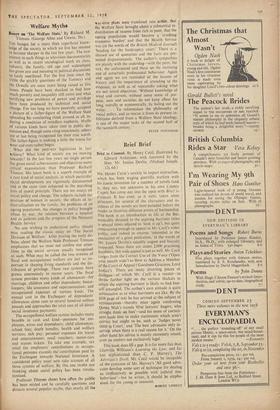Brief Brief
Brief to Counsel. By Henry Cecil, illustrated by Edward Ardizzone, with foreword by the Hon. Mr. Justice Devlin. (Michael Joseph, 12s. 6d.) MR. HENRY CECIL'S anxiety to impart instruction, which has been waging guerrilla warfare with his comic invention for a number of novels (and is, they say, not unknown in his own County Court), has come out into the open with Brief to Counsel. It has even, as it were, taken some prisoners, for several of the characters and in- cidents of the novels are here 'paraded before the reader to illustrate different points of barmanship. The book is an introduction to life at the Bar, ostensibly directed to the aspiring barrister (who is several times adjured to 'look it up'), but quite • entertaining enough to appeal to Mr. Cecil's wider public, and indeed to anyone 'interested in the mechanics of a great profession,' in the words of Mr. Justice Devlin's suitably august and biscuity foreword. Since there are under. 2,000 practising banisters, this wide appeal is just as well. M r. Cecil ranges from the Correct Use of the Voice ('Open your mouth wide') to How to Address a Member of the Court of Appeal ('Goodness Gracious, Lord Justice'). There are many diverting pieces of dialogue—of • which Mr. Cecil is a master—to throw further light on the various thickets in which the aspiring barrister is likely to find him- self entangled. The author's own attitude is quite informative as to what barristers are like. By the fifth page of text he has arrived at the subject of remuneration—thereby once again confirming Queen Mab's travels 'O'er lawyers' fingers, who straight think on fees'—and his sense of correct- ness leads him to make•statements which aren't correct but ought to be, such as 'Judges never sleep in Court,' and 'The best advocates only in- terrupt when there is a real reason for it.' On the other hand his advice is mostly extremely sound, even on matters not exclusively legal.
This book does fill a gap. It is far more fun than Glanville Williams's Learning the Law, and far less sophistiCated than .C. P.. Harvey's, The Advocate's Devil. Mr. Cecil would be incapable of the cynicism of Mr. Harvey's 'All good advo- cates develop some sort of technique for dealing as inoffensively as possible with judicial mis- behaviour'—but he writes, it should be empha- sised, for the young or innocent.
ROBERT LINDLEY


































 Previous page
Previous page